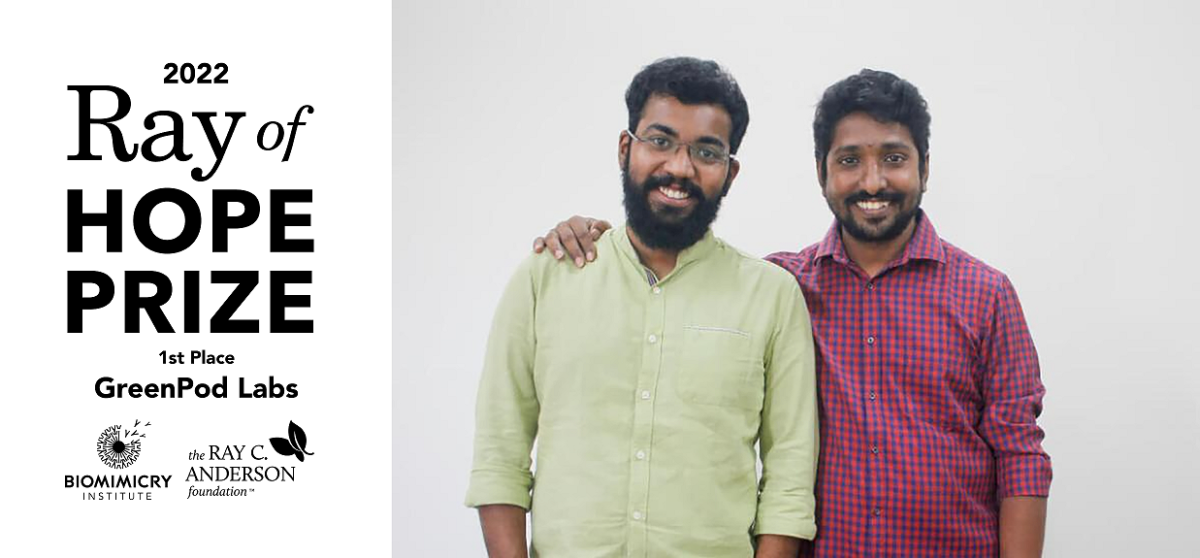Ray of Hope Prize® Awarded to GreenPod Labs for Nature-Inspired Solution to Food Loss

Ray of Hope Prize Awarded to GreenPod Labs for Nature-Inspired Solution to Foo…
November 16, 2022 /3BL Media/ - The Biomimicry Institute has awarded the 2022 Ray of Hope Prize® to GreenPod Labs, an India-based agricultural biotechnology startup focused on tackling food loss problems in developing countries. By learning how fruits and vegetables naturally resist pest and fungal pathogens, GreenPod Labs showcases how learning from nature can solve both climate and societal problems. As the 2022 Ray of Hope Prize recipient, GreenPod Labs will receive $100,000 in support of their groundbreaking work.
About a third of all food produced goes to waste, and in countries like India, much of that waste occurs on the farm or during storage and transport of the food. GreenPod Labs’ product line works without the need for cold storage by integrating a deep understanding of crop physiology, effectively communicating with crops to activate their built-in defense mechanisms. Their product can extend the shelf life of fruits and vegetables by 40 to 60% at ambient temperature and conditions. By focusing on markets in India and sub-Saharan Africa, this solution has the ability to solve some of the largest environmental and social challenges.
“We are proud to support GreenPod Labs as the 2022 recipient of the Ray of Hope Prize for their work to eliminate post-harvest food loss,” said Jared Yarnall-Schane, Innovation Director at the Biomimicry Institute. “Project Drawdown cites ‘reducing food waste’ as one of the most impactful things we can do to lower the amount of CO2 produced, while at the same time ensuring better livelihoods and nutrition for people around the world. We are inspired by GreenPod Labs' biomimetic approach to solving such a critical issue.
"The GreenPod Labs team consists of 17 innovators passionate about solving the food waste and food loss problem and has over 30 years of combined research and operational experience in agriculture and food biotechnology. When plants get infected by abiotic or biotic stress, they release unique volatile compounds that act as signal molecules to activate the defense mechanism in the neighboring plant to protect itself. Each plant has a unique composition of these compounds for different stresses, and the biomimicry behind GreenPod Labs’ solution replicates the unique plant volatile fingerprint for each crop to protect the fruits and vegetables after harvest.
“What won me over is that their nature-inspired solution not only minimizes food waste, but it also improves the health and financial well-being of thousands of farmers across India while conserving freshwater and mitigating carbon loss,” said one of this year’s judges, Andrew Courtney, Deputy Chief Science & Innovation Officer, VP of Programs, National Geographic Society. “This is a powerful business, conservation, and human story that is achieved through a seemingly simple innovation.”
GreenPod Labs has commercially launched three products so far in India, working with over 150 customers. Their unique targeting for specific plants, cost effective and easy-to-adopt approach, and plant-based chemistry sets them apart from competitors. In the coming months, 12 different products for crops will be developed, and funding from this year’s Prize will help the company further their innovative solution.
This year’s second place recognition goes to German-based Fusion Bionic, which has developed a cutting-edge laser technology capable of integrating biomimetic micro and nanostructures on a variety of material surfaces. Today's surface finishing technologies rely largely on ecologically harmful manufacturing processes, such as chemical etching (e.g. consumer electronics), sand blasting (e.g. medical), and coating solutions (e.g photovoltaics). Fusion Bionic’s Direct Laser Interference Patterning (DLIP) technology enables functional surface texture solutions inspired by natural surface structures such as those found on lotus leaves, shark skin, and moth eyes, to name a few. As Runner-Up, Fusion Bionic is awarded $25,000 to support their novel solution.
The Ray of Hope Prize, created in honor of the late sustainable business pioneer Ray C. Anderson, is awarded each year to the world’s top nature-inspired startup after 10 finalist teams conclude a 10-week accelerator program. This year, GreenPod Labs, Fusion Bionic, and eight other participating companies were selected from a pool of 212 applications from 54 different countries. The finalists and recipients were chosen from an expert judging panel, which included trusted experts in the field of biomimicry, industry, and entrepreneurship. All participants in the program learned about sustainable business practices, met with industry and startup mentors, refined their scientific communication skills, and were invited to an immersive retreat in the California Redwoods to reconnect with the natural world and form bonds with their fellow bio-inspired innovators.
The 2022 Ray of Hope Prize was made possible by our generous partners, the Ray C. Anderson Foundation. For more information about the Ray of Hope Prize or how to support this initiative, visit biomimicry.org/rayofhopeprize or email rayofhopeprize@biomimicry.org.
About the Biomimicry Institute
The Biomimicry Institute is a 501(c)(3) not-for-profit organization founded in 2006 that empowers people to create nature-inspired solutions for a healthy planet. To advance the solution process, the Institute offers AskNature.org, a free online tool that contains thousands of strategies found in nature and examples of ways they are used in design. It also hosts a Youth Design Challenge to support project-based education for middle and high school students; a Biomimicry Launchpad to catalyze more bio-inspired technologies; and the Ray of Hope Prize® for early-stage biomimetic companies to bring solutions to market. The Institute also supports an initiative called Design for Decomposition, which will pilot technologies that convert discarded clothes and textiles into biocompatible raw materials. For more information, visit biomimicry.org.
Media Contact
Lex Amore, Communications Director
Lex.amore@biomimicry.org
415-800-1407

